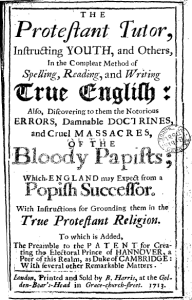
On November 5, 1604, a group of English Catholic conspirators led by a man named Robert Catesby attempted a terrorist attack on the English parliament. The plan was to detonate a thirty-six barrel cache of gunpowder that had been hidden in an undercroft (basement room) beneath the House of Lords at the Palace of Westminster.
The explosion was to be timed to the State Opening of Parliament, a commencement of parliament sessions featuring a speech from the monarch—then King James I of England (who was also James IV of Scotland). If successful, the plot very likely would have leveled the building, killed the king, and killed or injured the countless members of the House of Lords and House of Commons who were gathered there.
In the chaos that would follow, the conspirators planned to stage a full-fledged revolt centered in the English Midlands and then install Princess Elizabeth—the nine year old daughter of King James—as a puppet queen who would be raised Catholic and then later married to a Catholic husband (apparently whether she liked it or not).
Needless to say, the plot failed. An anonymous letter revealing its details had been sent to authorities, and so they searched the building around midnight the night before the State Opening. There, they found Guy Fawkes—one of the conspirators—guarding the cache of gunpowder. Fawkes was the one who would be responsible for lighting the fuse at the proper time before escaping.
The plot—known as the Gunpowder Plot, Gunpowder Treason Plot, or Jesuit Treason—resulted in a major operation to find and either capture or kill the conspirators. Several were indeed killed during the hunt, including mastermind Catesby. Eight surviving conspirators, including Fawkes, were tried, convicted, and then put to death. The British continue to celebrate the failure of the Gunpowder Plot on November 5 each year, lighting bonfires, burning effigies of Guy Fawkes (and, in earlier years, the pope), and setting off fireworks. They call it Guy Fawkes Day or Bonfire Night, and it’s the rough equivalent of our Independence Day celebrations here in the United States.
Considering Motivations

Of course it goes without saying that it is a good thing that the Gunpowder Plot failed. Terrorism is never acceptable, and the perpetrators of this heinous conspiracy deserved to be caught and punished to the full extent of the law. Before I go on, I want to be one-hundred percent clear about that. Nothing could have justified the Gunpowder Plot, which would have killed countless innocent people and thrown a nation—one generally operating as a free republic—into violent disarray.
And yet it is appropriate and valuable to consider motivation. We know that people can do bad things for bad reasons, and we know that people can do good things for good reasons. These are easy cases to understand. Things get more complicated and difficult to judge when people do good things for bad reasons, or, as in the case of the Gunpowder Plot, when people do bad things for good reasons.
The conspirators who attempted to kill the English monarch and decimate the parliament did so in a terribly misguided effort to free their fellow Catholic countrymen from persistent and violent oppression. And it is okay for us to learn about, understand, and even sympathize with that motivation . . . even as we rightfully condemn the terrorist act itself.
Seventy years earlier, King Henry VIII, angered by the pope’s [perfectly proper] refusal to grant him an annulment from his wife Catherine, declared himself the head of the Church of England and formally broke with the Catholic Church. Before then, Henry had been an ardent defender of Catholic doctrine against the growing Protestant heresies. Pope Leo X had even given him the title ‘Defender of the Faith’—ironic in light of what happened later. Following the break with Rome, Henry promoted clergy who supported him and accepted him as the head of the church. And he killed many who remained loyal to the Catholic Church, including Saint Thomas More who had served as the king’s Lord Chancellor.
Henry dissolved monasteries, convents, and friaries, appropriating their funds and property as his own, but largely maintained Catholic practice and doctrine despite his animosity toward the Catholic Church’s hierarchy and those who remained loyal to it. It was under the reign of Henry’s son, King Edward VI, and at the behest of Archbishop Thomas Cranmer of Canterbury, that the Church of England began to shift its practices in a much more Protestant direction.
Catholicism was again the state religion during the five-year reign of Queen Mary I, a daughter of Henry VIII who had maintained her Catholic faith, but the country returned to Protestantism under Queen Elizabeth I, Mary’s half-sister, and has remained so ever since.
Persistent Persecution

It was considered treason to be a faithful Catholic in England from then until the nineteenth century—about three hundred years. Catholics were barred from public service, barred from holding masses, barred from voting, forced to pay tithes to the Church of England that they considered heretical, and were subject to countless other indignities both small and large. Between 1534 and 1680—the period where Catholics were regularly executed for their beliefs—many hundreds were put to death by hanging, drawing, and quartering. Well over a hundred of these martyrs have since been recognized and beatified by the Catholic Church.
This is the background against which the conspirators behind the Gunpowder Plot were operating. They were Catholics who were repeatedly punished and oppressed for their beliefs. They had witnessed the killing of their priests and the imprisonment of their coreligionists. They felt that they had to do something . . . and perhaps they did have to do something. People have an obligation to fight for what is right, to defend freedom and liberty, to oppose oppressors, and to exert their right to individual and national self-determination.
But does this justify a plot to assassinate national rulers and kill countless innocents in the process? No. One could argue that a government building and state leaders engaged in anti-Catholic tyranny are fair military targets, but I disagree in this case . . . in large part because this was not a military action, there was no civil war in progress, the government was (and remains) largely republican in form, and many of those who would have been killed bore no responsibility for anti-Catholic violence. Catholics should know better than most that the ends, no matter how righteous they may be, do not justify immoral means. You cannot do a bad thing even if you have good reasons. Two wrongs do not make a right. And this is why it is perfectly proper to condemn the Gunpowder Plot and celebrate its failure.
As is often the case when people resort to terrorism to advance their cause, the plan backfired epically. The conspiracy by Catholics to kill the king and destroy the parliament did not free the English Catholics. On the contrary, the plot resulted in a strengthening of anti-Catholic sentiment, the increased persecution of Catholics under existing laws, and parliamentary efforts to make those laws even stronger and less forgiving than they already were. Anti-Catholicism would remain an English norm for hundreds of years to come. Though the worst laws were loosened and the executions stopped in the early nineteenth century, animosity toward the Catholic Church has only recently begun to give-way in the United Kingdom.
In the particular case of the Gunpowder Plot, reprehensible as it was, the terrorists did have a real and legitimate complaint. A fair observer can, and should, simultaneously condemn the plot (and the plotters) while still acknowledging that beneath it lay a valid point that should have been considered and addressed by English society.
Some terrorism is committed in service of objectively good causes, like the right of English Catholics to live and worship freely. Other terrorism is committed in service of objectively bad causes, like the Islamic State’s efforts to destroy western civilization and establish a worldwide Islamic caliphate. And sometimes terrorism is committed in service of more nuanced or mixed causes that can’t be easily labeled as good or bad. Most Palestinian terrorism is motivated by a melange of reasons, some good (Palestinian independence and self-determination) and some bad (the destruction of Israel and a repudiation of Israeli independence and self-determination).
Dispassionate Evaluation

In all of these cases we should condemn the acts of terrorism themselves, and the terrorists who commit them, while also giving fair and dispassionate consideration of their motivations. The specific reasons motivating terrorism are essential to our understanding how best to respond to it. One size does not fit all.
The correct response to the Gunpowder Plot would have been to start loosening restrictions on Catholic faith and practice. Of course, those Catholics who wanted to re-Catholicize England by force should have been stopped, but those innocent Catholics who were being treated badly should have been made free to practice their faith. Punish the plotters, stop the radicals, but also take positive steps to do the right thing (and thereby reduce the likelihood of future radicalization).
This is not always the case. In the case of the Islamic State, none of their terrorists’ motivations are objectively good. They do not seek freedom or self-determination; they already have it in their national territories. They seek the subjugation of others. They seek the death of innocents and violent mayhem for its own sake. And so, in this specific case, no concessions can be made as part of a reasonable response. Only containment and destruction of the enemy can work when the enemy’s motivations have no basis in reality.
But in the case of the Palestinians, we should concede that some of their demands are reasonable even if the violence they commit is not. And so the world powers (including Israel) should offer the Palestinians full sovereignty over their territory and full recognition of their right to self-determination. The Israeli occupation and settlements in Palestinian territory must come to an end. At the same time, we should insist that the Palestinian people accept Israel’s right to exist and stop committing acts of war against them. As with England in the case of the Gunpowder Plot, Israel should fight the violence and radical beliefs while, at the same time, making concessions in those areas where they are doing wrong and unnecessarily inflaming radicals against them.
Whenever a nation is faced with terrorism, it should take some time—after the dust has settled and the dead have been buried—to do a fair amount of introspection. Oftentimes this introspection will result in confirmation that the victim nation has done nothing wrong. The United States, for example, did nothing to warrant al-Qaeda or Islamic State attacks (despite claims to the contrary by those groups and their domestic enablers). But sometimes—as when the Gunpowder Plotters attempted to attack the English parliament, or when West Bank Palestinians attack Israel—there are real wrongs that, while they do not justify the terrorism, still need to be acknowledged and corrected by the victim nation.
Doing so has the unfortunate side-effect of validating the terrorists . . . but it also shows the victim nation to be the ‘better person,’ not above admitting when they have done something wrong, and not above making corrections. This will also go a long way in many cases toward undermining terrorist recruiting. It is generally easier to recruit terrorists to a cause that has some basis in reality (with the notable exception of terrorist groups that use religious fervor as their primary recruiting tool—al-Qaeda and the Islamic State being two examples). So, when possible, victim states should stop doing whatever objective wrongs happen to be contributing to violence.
Colorado Springs

And this brings us to another terrorist attack. On November 27 of this year, in Colorado Springs, Colorado, three were killed and nine injured during a shooting spree and standoff at a Planned Parenthood facility. Robert Lewis Dear Jr., apparently motivated by opposition to abortion and an extremist form of evangelical Christianity, was responsible for the carnage.
Before I continue, I want to reiterate yet again that terrorism is never acceptable. Dear deserved to be caught, and should be punished to the full extent of the law—which, in Colorado, could include the penalty of death. Yet, as in the other terrorism cases we’ve discussed, we must take some time to examine Dear’s motives, do some introspection, and consider whether there are any national wrongs here that need to be corrected.
Planned Parenthood is a national non-profit organization that brands itself as a ‘reproductive health’ provider, which is a kind of rhetorical misdirection that has become all too common these days. In fact, most of Planned Parenthood’s services are oriented toward what would be more accurately called ‘interference with reproductive health.’ The contraceptive services that are the backbone of what Planned Parenthood does, regardless of whether you consider them to be morally acceptable, are obviously designed to break or prevent the natural functions of the human reproductive system. If you developed a pill that prevented my eyes from performing their normal, natural functions, it would be inaccurate at-best to label that pill a component of ‘ocular health’ (even if there were times, for whatever reason, that such a pill might be useful).
More controversially, Planned Parenthood is also the nation’s leading provider of abortion. I have discussed the abortion issue before, most directly in a 2011 piece titled ‘That Among These is Life.’ In short, there is no question—morally or scientifically—about when human life begins. It begins at conception, when sperm and egg cells combine to form a zygote with its own unique human DNA. That zygote becomes a blastocyst, then an embryo, then a fetus, and then a baby. Although every person is dependent upon his or her mother in the early phases of their life, every child is its own creature and develops according to its own genetic blueprint. When we say, as our Declaration of Independence does, that all human beings are endowed by their creator with certain unalienable rights, it is most logical to argue that those rights are endowed at the moment that life begins and continue until natural death. From all of this, it follows that aborting a fetus—except in the rarest of cases when it is necessary to save the mother’s life—is an unjust killing.
Like the English government killing Catholic priests, or allowing others to do so with impunity, the United States government allows Planned Parenthood and others to kill about a million innocent human beings every year. Our federal, state, and local governments fund—directly or indirectly—some subset of those abortions. Planned Parenthood alone receives about five hundred million dollars in government funding each year. The organization insists that these funds are not used for abortions, which may be strictly true but is irrelevant for two reasons: First, money is fungible, meaning one dollar is completely exchangeable for another, so any dollar that goes into Planned Parenthood’s coffers is supporting everything they do. Second, well, you can’t send a million dollars to the Islamic State (for example) and claim that you’re not supporting evil because that million dollars is earmarked for paving roads. You’re still supporting the Islamic State, and the Islamic State is still evil, even if your particular dollars are meant for some morally neutral aspect of their operations. This would be true even if, say, only three percent of the Islamic State’s activities were terrorism-related.
With all of this considered, the proper response to terrorists like Dear is very much like what the proper response to the Gunpowder Plot would have been. We must reiterate again that the ends, no matter how righteous they may be, do not justify immoral means. You still cannot do a bad thing even if you have good reasons. Two wrongs still do not make a right. And so Dear should be punished and we should fight tirelessly as a society to prevent other radicals like him from causing harm. But at the same time, we should also take positive steps as a nation to do the right thing (and thereby reduce the likelihood of future radicalization).
Like England should not have let the Gunpowder Plotters obscure the actual wrongs being done to English Catholics, the United States should not let Dear and people like him obscure the fact that a million innocent human beings are being killed—legally—right here in the ‘land of the free’ every year. We could follow England’s lead and let violence beget more violence for centuries to come, using another’s evil act as cover for our own intransigent refusal to do right. Or we could do something better; we can lead the world in a renewed march forward for human rights.
This is an opportunity for us to admit that our nation, in allowing the wanton killing of innocents, has done something wrong . . . and it is an opportunity for us to renew our efforts to set it right. Let’s not let evil win; let’s fight it, no matter whether it comes clothed as an evangelical Christian or as a ‘reproductive health’ provider.
